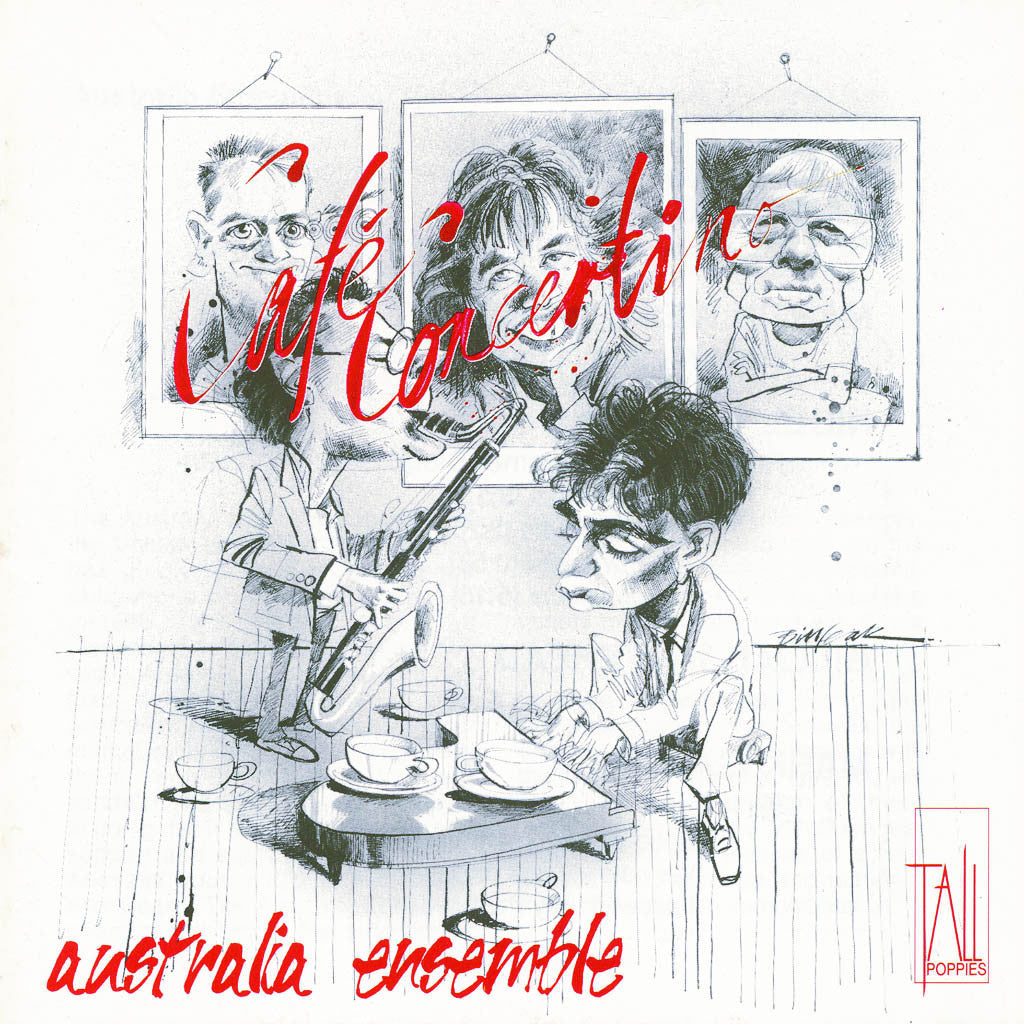Cafe Concertino - Australia Ensemble
The Australia Ensemble is a talented and committed group of musicians who take their responsibility toward Australian music seriously. They would also seem to take their responsibility to their audience seriously for the five pieces on their recent CD, all of them commissioned by the group, reveal a directness of approach which renders them immediately accessible to the average listener.Perhaps the best-known composer represented here is Carl Vine. His Cafe Concertino is an attractive glance back to the popular Parisian-inspired pieces of Milhaud.
Much of the work is dominated by the brilliant pianism of David Bollard while the busy ostinatos of the outer sections give the work a rhythmic impulse which throws the calmer middle section into relief. Martin Wesley-Smith's charming piece for flute, bass-clarinet and tape is a tribute to the story-telling ability of Lewis Carroll. While much of the prepared tape is devoted to musical-box sounds, the two protagonists of the title, representing Carroll and Alice, perform material derived from nursery rhyme melodies.
The Ensemble's clarinettist, Nigel Westlake, spent some time in Amsterdam studying both clarinet and composition. Not surprisingly, the influence of the Dutch minimalists is present in his piece which is difficult for the performers and, at first hearing, for listeners too. However, its shifting textures and his control of instrumental colour reveal him to be a composer of real talent.
The finest of the works on the disc is by Gillian Whitehead, the only non-Australian composer represented. She worked with Peter Maxwell Davies before going to Australia to teach at the University of Sydney. Manutaki is a wonderfully atmospheric, and often dreamy evocation of a land and sea-scape in her native New Zealand. Mark Isaacs has written a piece that can be enjoyed at first hearing. Despite its modernistic effects, it is, at heart, the work of a full-blooded romantic, though one with plenty of rhythmic vitality. The Ensemble is to be commended for its enterprise and the record deserves to be heard in places other than Earl's Court.
Gramophone (7/1992)
The Australia Ensemble is a talented and committed group of musicians who take their responsibility toward Australian music seriously. They would also seem to take their responsibility to their audience seriously for the five pieces on their recent CD, all of them commissioned by the group, reveal a directness of approach which renders them immediately accessible to the average listener.Perhaps the best-known composer represented here is Carl Vine. His Cafe Concertino is an attractive glance back to the popular Parisian-inspired pieces of Milhaud.
Much of the work is dominated by the brilliant pianism of David Bollard while the busy ostinatos of the outer sections give the work a rhythmic impulse which throws the calmer middle section into relief. Martin Wesley-Smith's charming piece for flute, bass-clarinet and tape is a tribute to the story-telling ability of Lewis Carroll. While much of the prepared tape is devoted to musical-box sounds, the two protagonists of the title, representing Carroll and Alice, perform material derived from nursery rhyme melodies.
The Ensemble's clarinettist, Nigel Westlake, spent some time in Amsterdam studying both clarinet and composition. Not surprisingly, the influence of the Dutch minimalists is present in his piece which is difficult for the performers and, at first hearing, for listeners too. However, its shifting textures and his control of instrumental colour reveal him to be a composer of real talent.
The finest of the works on the disc is by Gillian Whitehead, the only non-Australian composer represented. She worked with Peter Maxwell Davies before going to Australia to teach at the University of Sydney. Manutaki is a wonderfully atmospheric, and often dreamy evocation of a land and sea-scape in her native New Zealand. Mark Isaacs has written a piece that can be enjoyed at first hearing. Despite its modernistic effects, it is, at heart, the work of a full-blooded romantic, though one with plenty of rhythmic vitality. The Ensemble is to be commended for its enterprise and the record deserves to be heard in places other than Earl's Court.
Gramophone (7/1992)

